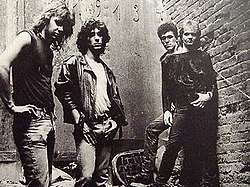Bezobrazno Zeleno
Bezobrazno Zeleno (Serbian Cyrillic: Безобразно Зелено, trans. Rudely Green) were a former Yugoslav new wave/pop rock band from Belgrade. The band was notable as the participant of the Artistička radna akcija project as well as for their later works.
Bezobrazno Zeleno | |
|---|---|
 Bezobrazno Zeleno in 1989 | |
| Background information | |
| Origin | Belgrade, SR Serbia, SFR Yugoslavia |
| Genres | New wave, pop rock |
| Years active | 1980 – 1984 1988 – 1991 |
| Labels | Jugoton, PGP-RTB |
| Associated acts | Babe, Disciplina Kičme, Ekatarina Velika, Električni Orgazam, Kazna Za Uši, Pasta ZZ, Radnička Kontrola, Riblja Čorba, Kurajberi |
| Past members | Bojan Vasić Branislav Petrović Dragoljub Spasić Ivan Kljajić Katarina Benedetić Saša Komadinović Srđan Todorović Vojislav Bešić Zoran Ilić Zoran Janić, Pedja Bajčetić |
History
New wave years (1980-1984)
The band was formed in 1980 by Bojan Vasić (bass guitar), Vojislav Bešić "Beške" (guitar, vocals), Dragoljub Spasić "Điđi" (drums) and Katarina Benedetić (vocals). The band got the name as a rebellious reaction to the phrase commonly used for the young, being "green". The band was the participant of the Artistička radna akcija compilation, featuring the second generation of the new wave bands from Belgrade, with the tracks "Bežim niz ulicu" ("I'm Running Down the Street") and "Beograd" ("Belgrade").
Due to the Bešić and Spasić's departure to the Yugoslav People's Army, former Radnička Kontrola drummer Srđan "Žika" Todorović and guitarists Zoran Ilić and Branislav Petrović "Banana", the latter a former Pasta ZZ) member, joined the band. The band member was also Zoran Janić who later joined the band Vrele Usne.
The band appeared on the first Ventilator Demo Top 10 show in February 1983 with the song "Običaji" ("Customs"). Their debut album, BZ1, was produced by Momčilo Bajagić in 1983 and featured "Bežim niz ulicu", hit ballad "Gibaj se" ("Limber Yourself Up") and "Jutro" ("Morning"), a cover of the Butik song composed by Nebojša Antonijević. The album ought to have included the song "Long live moja Srbijo" ("Long Live My Serbia") which was denied by the PGP-RTB records. The band also had to change the lyrics for the track "Momci sa juga" ("The Boys from the South"). Roze Poze vocalist Vlada Milačić appeared on the album as a guest.
In Spring 1984, the band played in Dom Omladine in Belgrade as an opening act for Momčilo Bajagić who presented his first solo album Pozitivna geografija. Soon after, the group disbanded. Petrović joined Električni Orgazam, Todorović started an acting career and played with Disciplina Kičme, Ekatarina Velika and Kazna Za Uši. Vasić started working as a mailman.
Reformation and breakup (1988-1991)
In 1988, Vasić and Ilić reformed the band with Spasić on drums, former Šlogirani Karanfil vocalist Saša Komadinović "Džeger" and guitarist Ivan Kljajić. Together they recorded their comeback record Neonske bajke (Neon Fairytales). The songs were written by Vasić and Ilić, backing vocals were done by Dejan Cukić and the album was produced by Bajaga i Instruktori bassist Miroslav Cvetković "Cvele". Beside their own songs, cover versions of Frank Zappa's "Bobby Brown" and Sweet hit "The Ballroom Blitz", with lyrics in Serbian language entitled "Divlje dete" ("Wild Child"), appeared on the album. The album also featured Vasić's song "Diraš me" ("You're Touching Me"), which later appeared on Cukić's solo album Spori ritam (Slow Rhythm), and Ilić's theme "Deca sa meseca" ("Children from the Moon"), which later appeared on Riblja Čorba album Koza nostra (Cosa Nostra) as "Ja je gledam kako spava" ("I Am Looking at Her while She Is Asleep").
In 1991, with the beginning of Yugoslav wars, Komadinović moved to South Africa and the band split up
Post breakup
Vasić followed Komadinović to South Africa, and together they formed a club cover band. In 1994, Vasić returned to Yugoslavia and formed the band Kurajberi, featuring Ekatarina Velika keyboard player Margita Stefanović, former Van Gogh vocalist Goran Milisavljević and his former bandmates, guitarist Ivan Kljajić and drummer Dragoljub Spasić. They performed cover versions of foreign and Yugoslav rock songs. Petrović also performed with the band and recorded. They disbanded in 1995 when Vasić stopped performing and started working as a designer and tattoo master. He also wrote the lyrics for Dejan Cukić and the band Njujork. Ilić became the member of Riblja Čorba in 1989 and in 1992 formed Babe with Bajaga i Instruktori member Žika Milenković and Električni Orgazam member Goran Čavajda "Čavke". Bešić moved to New York City where he became the member of the band LFAnt. Kljajić started working as a producer and joined Ana Stanić's backing band.
Legacy
In 2008, Serbian punk rock band Novembar released a cover of Bezobrazno Zeleno song "Bombarderi" ("Bombers") on their album Radulizam.[1]
In 2011, the song "Gibaj se" was voted, by the listeners of Radio 202, one of 60 greatest songs released by PGP-RTB/PGP-RTS during the sixty years of the label's existence.[2]
"Beograd" and "Bežim niz ulicu" lyrics were featured in Petar Janjatović's book Pesme bratstva, detinjstva & potomstva: Antologija ex YU rok poezije 1967 - 2007 (Songs of Brotherhood, Childhood & Offspring: Anthology of Ex YU Rock Poetry 1967 - 2007).[3]
Discography
Studio albums
- BZ1 (1983)
- Neonske bajke (1989)
Other appearances
"Beograd" / "Bežim niz ulicu" (Artistička radna akcija, 1981)
See also
References
- Radulizam at Discogs
- 60 хитова емисије ПГП на 202!, facebook.com
- Janjatović, Petar (2008). Pesme bratstva, detinjstva & potomstva: Antologija ex YU rok poezije 1967 - 2007. Belgrade: Vega media.
- EX YU ROCK enciklopedija 1960-2006, Janjatović Petar; ISBN 978-86-905317-1-4